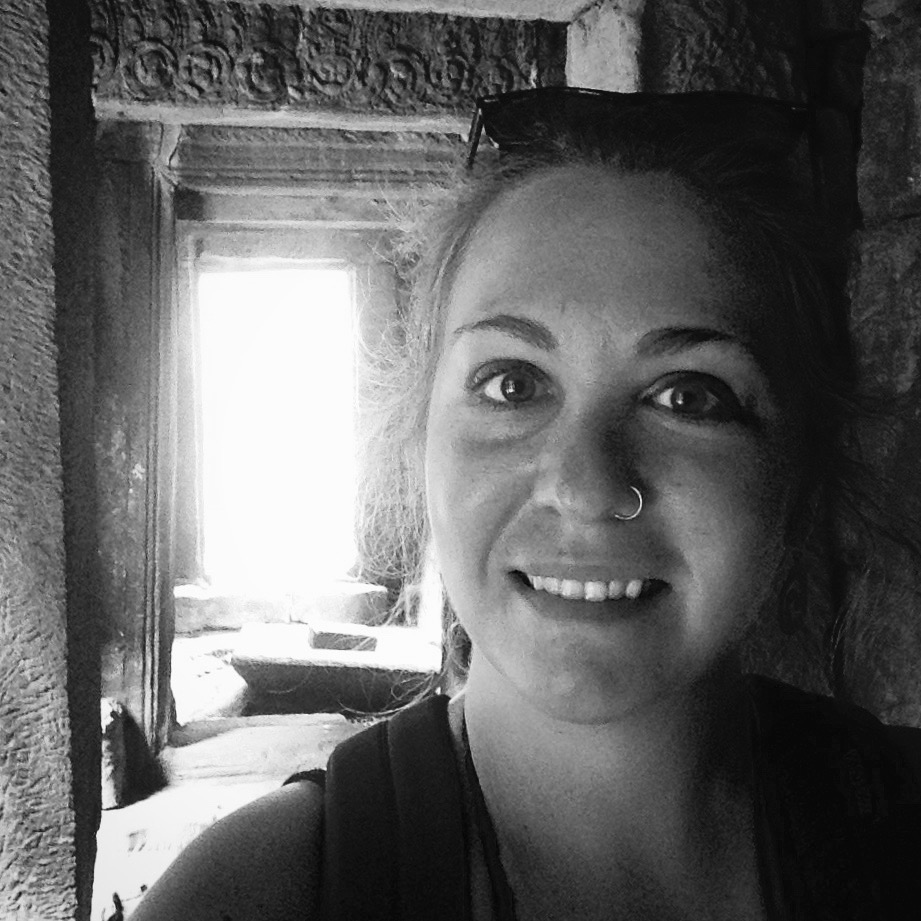Review by Sam Cha
Theadora Siranian
She
Seven Kitchens Press
 In “Origin Myth, Pt. 1,” the first poem of Theadora Siranian’s new chapbook She, the speaker is trapped in a kind of death waltz with a woman. We don’t know, yet, what the specific relationship is between them—are they lovers? Family? All we know is that the relationship, whatever it is, is poisonous and tender:
In “Origin Myth, Pt. 1,” the first poem of Theadora Siranian’s new chapbook She, the speaker is trapped in a kind of death waltz with a woman. We don’t know, yet, what the specific relationship is between them—are they lovers? Family? All we know is that the relationship, whatever it is, is poisonous and tender:
We drink hemlock in the moonlight and cup our bodies toward
one another against the cold
The body of the loved one—their embrace, their warmth—becomes the cup from which you drink the numbing poison. (As they, also, drink from yours.) We remember our Plato: hemlock kills when the cold, spreading inward from one’s extremities, reaches the heart.
The speaker figures the woman in a constellation of images that evoke Sylvia Plath. She is “trapped within a pulsing bell” (The Bell Jar); the “flames” emerging from her mouth are “hot and curved as a tongue” (recalling the “tongues of hell” and the “pure acetylene / Virgin” of “Fever 103º”); her murmur is “the hiss of gas”; she speaks of a place “where the bees don’t die.” There’s a denseness of allusion here that is meticulously, deliberately, claustrophobic. All of this—the poison, the embrace, the Plath and Plath and Plath—the speaker has already told us, is prelude, is the “world before.” It takes place in a “snowglobe, a halo / of light”: a fragile bubble of time, the shell of radiation surrounding the dead. It’s a “feverdream.”
Then the snowglobe, the fever, the whole poem breaks open. (Guns are meant to go off in the third act; snowglobes are meant to fall to the floor.) Throughout the poem the woman has been active, full of purpose. She controls, she defines. She tells the speaker that she will make a world for them. She tells the speaker that their relationship is “not cannibalism.” She “turns [the speaker’s] face toward the starshattered darkness.”
We imagine her hand, grasping the speaker by the chin, forcing the speaker to turn her head. There’s an impression of physical competency, of strength—a mythic strength, stemming from a connection to an otherworld. But the poem ends with the woman translated, imperfected, back in the quotidian. She stands in a convenience store, a gallon of milk about to slip from her hand (weakened? failing?), about to be split on the floor. The world, the speaker knows, will break with it.
Later in the book, Siranian will confirm that the two figures here are mother and daughter, but there’s a heft to this particular image that clarifies the relationship between the speaker and the woman, even before we read “My Unconscious Contemplates My Mother’s Disease.” Every child who has loved and feared their parents carries with them at least one image in which the parent is transformed and enshrined, in a way that makes the image function both as religious icon and memorial—as a reminder of continued presence and as a marker of absence. In a dream I once saw my father outlined in rays of tiger-striped light in the form of a great cat. I woke up and I thought of the outlines of hands on cave walls, how the first human artists held a hand to the stone and rubbed over hand and stone with blood-colored ochre, how they took the hand away, leaving a ghost, a shape knowable only by loss, and I knew then with a kind of calm and unprovable certainty that the hands the cave-artists held were not the living hands of the artists, but the hands of the recent, and complicatedly beloved, dead.
Many of the poems in She function in this way, carry this charge.
In “Gala and the Tigers,” the figure of the mother becomes a dead giant, “naked […] stretched out in the parking lot […] finally/void of complexities.” In “Origin Myth, Pt. 2” the speaker sees her mother as a “cracked thermometer’s mercury,” oscillating with “exquisite terror.” In a stunning quick-change rush of images in “Albedo,” the mother first eats the sun and then becomes the sun, constantly exploding into rays of corrosive light. The light of the mother enters the daughter-speaker like the holy ghost, burning a hole in her, making her holy.
The sense we have in these poems of the daughter-speaker at times struggling to find the boundaries between herself and her mother—the mother entering, shaping, eroding the daughter, even as the mother herself declines and dissolves—is made literal for the reader by the presence, in the book, of poems written in the voice of the speaker’s mother. At first we experience these poems, all titled “Her,” as moments of disorientation and doubt—whose voice is this?—mirroring, perhaps, the emotions of the daughter-speaker, who, though she may be silent in the body of the poem, is nevertheless implied in the third-person viewpoint of the title. (Since the “Her” of the title has to refer to the mother, the title of each poem in the mother’s voice is not written in the mother’s voice, but in the daughter’s.)
The differences between the voices, though real, are subtle, unobtrusive. One voice is more likely to swear, and to reference poetry. The other is fond of movies that belong to an earlier era, and of images of flight. But the voices intertwine and echo from poem to poem—fitting, for a relationship that the daughter-voice figures as a religion, as inextricable, as a perpetual breaking, a gash, a “gorgeous, exhausting puzzle.”
The mother’s “thirst for salt” leads to the daughter “running/ [her] tongue along// […] bodies like some/ desperate, winter animal/ to the salt lick.” The daughter imagines herself as Persephone, unwilling to return from the underworld to the side of her mother, which seems to lead, in the book’s final poem, to the mother finding, “inside the earth, a cramped green bowl.” The myth itself seems to have undergone a switch, a metamorphosis—it is the mother who is carried off by death; the daughter who is forced to bear witness, to search. “Others will always find a way to teach you about love,” the daughter says.
She does that, gorgeous, painful and true.
 SAM CHA is a Korean-American poet/essayist. A winner of the 2017 St. Botolph’s Club Emerging Artist award, he’s the author of a chapbook, American Carnage (Portable Press @ Yo-Yo Labs), and of The Yellow Book ([PANK] Books), a full-length collection of cross-genre work. Cha lives and writes in Cambridge, Mass.
SAM CHA is a Korean-American poet/essayist. A winner of the 2017 St. Botolph’s Club Emerging Artist award, he’s the author of a chapbook, American Carnage (Portable Press @ Yo-Yo Labs), and of The Yellow Book ([PANK] Books), a full-length collection of cross-genre work. Cha lives and writes in Cambridge, Mass.
THEADORA SIRANIAN is a graduate of the M.F.A. Program at the University of Massachusetts, Boston. Her poetry has appeared in Best New Poets, Ghost City Review, Consequence Magazine, Rust + Moth, and Atticus Review, among others. In 2013, she was a finalist for The Poet’s Billow Pangaea Prize, and in 2014 was shortlisted for the Mississippi Review Prize and Southword’s Gregory O’Donoghue International Poetry Prize. In 2019, Theadora received the Emerging Woman Poet Honor from Small Orange Journal. She lives and teaches at Nazarbayev University in Nur-Sultan, Kazakhstan, where she is poetry editor for Angime, the first trilingual literary journal in the country.

